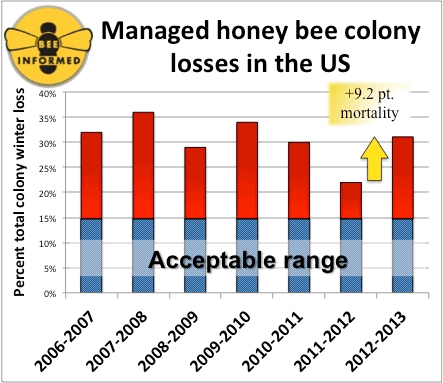For the 2012/2013 winter season, a total of 6,287 U.S. beekeepers provided validated responses. Collectively, responding beekeepers managed 599,610 colonies in October 2012, representing about 22.9%1 of the country’s estimated 2.62 million colonies.
Preliminary survey results indicate that 31.1% of managed honey bee colonies in the United States were lost during the 2012/2013 winter. This represents an increase in loss of 9.2 points or 42% over the previous 2011/2012 winter’s total losses that were estimated at 21.9% (Figure 1). This level of loss is on par with the 6 year average total loss of 30.5%2.
On average, U.S. beekeepers lost 45.1% of the colonies in their operation during the winter of 2012/2013. This is a 19.8 point or 78.2% increase in the average operational loss compared to the previous winter (2011/2012), which was estimated at 25.3%. The difference between average loss and total loss is explained by the respondent pool: while a majority of the respondents (95%) were backyard beekeepers, they managed a small fraction of the colonies represented in the survey (6%). For this reason total loss (which is more heavily influenced by commercial beekeeper losses) is more representative of national losses.
Survey participants indicated that they considered a loss rate of 15% as “acceptable,” but 70% of them suffered losses greater than this.
- Based on NASS 2012 figures
- Previous survey results found a total colony loss in the winters of 21.9% in the winter of 2011/2012, 30% in 2010/2011, 34% in 2009/2010, 29% in 2008/2009, 36% in 2007/2008, and 32% in 2006/2007 (see figure attached)
The Bee Informed Partnership is funded by the National Institute of Food and
Agriculture, USDA.





No comments:
Post a Comment